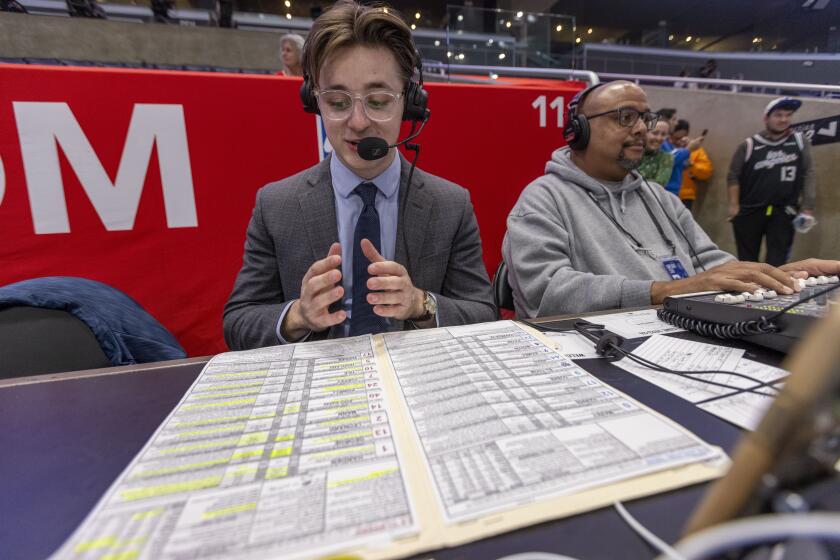Early Agent Signings Strain Relationship Between College, Pro Football
The billion dollar world of college football has been shaken by a scandal as shocking to some as the “insider trader” scandals that ripped through Wall Street.
Like those on the business front, college football’s problems involved a combination of big money, secret meetings and illegal agreements.
At the heart of the drama were some of the nation’s best college football players who violated NCAA rules by entering into secret agreements with agents in return for cash. Those agreements gave agents the right to represent the players in any subsequent dealings with the NFL.
The result is a threat to the structure of both college and pro football which have enjoyed a good relationship for many years.
Football insiders were aware a scandal had been simmering for a long time. But even they don’t know how many players were involved.
“The number of early signings has varied from year to year,” said sports attorney Leigh Steinberg, who represents many of the NFL highest paid players. “One year it was near 50% and then it dropped below 20. I would think that last year probably 35% of the players taken in the top rounds had signed early. But, from what has come out, that 35%figure may be low.”
Two highly publicized cases involved Cris Carter, an All-America wide receiver at Ohio State, and University of Pittsburgh running back Tony Gladman.
Carter was about to enter his senior season with the Buckeyes when word leaked that he had signed an agreement with sports agent Norby Walters. Ohio State quickly declared Carter ineligible. Pitt dropped Gladman, who reportedly took money from Walters and Lloyd Bloom.
Those colleges solved their immediate problems but the ineligible players posed a dilemma for the NFL. Here were players who were banned from college football with no opportunity to turn pro this season.
Commissioner Pete Rozelle scheduled a supplementary draft, which was much criticized as “rewarding” players who had cheated, then postponed it in the hope that something could be worked out so that Carter and Gladman might have their college eligibility reinstated.
But Ohio State State President Edward Jennings said his school would not appeal to the NCAA for a reinstatement of Carter. Pitt officials said Gladman did not contact them about reinstatement.
Finally, on Sept. 4, Carter was selected by the Philadelphia Eagles in the special draft but Gladman was passed over.
“It’s (holding a supplemental draft) as if they are being rewarded for violating the rules,” said Carl Miller, athletic director at the University of the Pacific and head of a national athletic directors organization. “These are not babes in the woods. They know the rules. They want to be treated like adults, so we should treat them like adults.”
Miller says a supplementary draft could fatally strain the delicate relationship between college and professional football.
“We’ve always had a good working relationship with the NFL, but now that is in jeopardy,” he said.
Said sports attorney Bob Woolf, who represents Larry Bird, Vinny Testaverde, Joe Montana, Doug Flutie among many others, “Early signing have been going on for a long, long time. But to me it’s shocking that a newcomer (Walters was in sports representation just three years) could sign 30 to 40 players. That’s unbelievable.
“It makes you wonder about the moral fiber of the athletes in college today. You can blame the agent all you want, but athletes bear a lot of the responsibility also.”
On Sept. 9, Rozelle said he hopes there are few future cases that call for a supplemental draft.
“I certainly hope we can avoid that,” Rozelle said. “It wouldn’t be good for the NFL or the athletes. They need that time (college) for physical and emotional development.”
Some legal action has followed the scandals.
A federal grand jury in Chicago subpoenaed dozens of college players--including top draft picks Reggie Rogers of the University of Washington (signed by Detroit) and Brent Fullwood of Auburn (signed by Green Bay)--and others focusing on allegations that Walters and Bloom were engaged in racketeering and fraud.
The Big 10 Conference filed a lawsuit Aug. 24 in Chicago federal court, seeking to force the pair to disclose the names of all active college players they have under contract.
To solve the problem, industry-wide controls are being urged.
“There is no question you have to regulate this industry,” Woolf said. “I’m personally for federal regulation.”
Steinberg said he favors bringing in state government as a regulating agency, but would also like to see the NFLPA take a more active role.
“The union regulates agents of veteran players, but not those talking to college athletes,” he said. “What has happened because of this system is the people who need the regulation the most--the college seniors--have not been covered. I think the NFLPA should extend its policy to agents of any potential NFL player.”
Some states have already taken steps to regulate the booming sports representation industry.
California was the first to pass a tough state law prohibiting the signing of underclassmen. The law gets its first court test this fall in a suit in which Reggie Rogers is asking a Superior Court judge to void a contract he signed with Walters in his mother’s Sacramento home before his senior season at the University of Washington.
Ohio, Oklahoma, Michigan, Texas and Alabama currently are studying potential state laws to regulate the industry.
Miller hails such action.
“States are going to have to get involved,” he said. “Because I really do not think federal regulation is the answer. Laws have a tendency to be stronger and better enforced if they are at the grass roots level.”
Steinberg also feels the NCAA should change the structure of its scholarships.
“I think the NCAA has to redefine the amount of money it gives out in scholarships,” he said. “I think that amount needs to include $200 to $300 in laundry money a month. Not so the athlete can live like a prince, but so he does not have to worry about money day-to-day. There should also be some kind of short-term loan system where if a player gets into financial trouble, he can go to the athletic department and arrange a loan. This would help to make the agents offering under the table money much less attractive.”
College coaches also are getting into the act. On campuses across the country athletes were warned of the dangers of dealing with agents.
“Agents are not allowed on this campus,” said Michigan State coach George Perles. “If a player is contacted by one, he is to report it to me immediately. Our kids know that agents have no business around here.”
Perles said it was his responsibility to make sure Spartan athletes know the cost of making any kind of arrangement with an agent.
“We tell them each year that if the start monkeying around with agents their college career is going to be over,” Perles said. “Not only are they not going to play in college, chances are they’ll never finish their degree.”
However, Ohio State coach Earl Bruce says the problem arises with unscrupulous agents.
“We don’t have trouble with the good agents,” the OSU coach said. “It’s just the racketeers and the crooks.”
The causes of the current scandal are numerous. They spring from the basic structure of college football, the enormous growth in the sports representation industry and simple human greed.
Football is the only one of the three major American pro sports -- football, basketball and baseball -- in which a college athlete has to compete for four years on the collegiate level before he can move on to the pros.
“I think the system is rather ridiculous,” Steinberg said. “Being able to go to the professional ranks early has not hurt the quality of either college basketball or baseball. If it was to hurt any sport, I would think basketball would be the one. After all, you only have five starters. In football, you have 22.”
There is also the legal question--can the NFL legally set a limit on its participants? Spencer Haywood successfully challenged the NBA elgibility rule in 1971 setting the scene for the early eligibility draft. On Feb. 29, 1984, a federal judge in Los Angeles ruled that the U.S. Football League could not prevent Bob Boris, a former University of Arizona punter, from trying out for a team.
Boris had signed a letter of intent and played for Arizona for two seasons before signing with an agent and thus becoming ineligible for collegiate sports. The NFL was not party to the suit, but the USFL eligibility rules were identical to those of the NFL.
“There is no question the draft and the rule forcing players to stay in school are illegal,” Woolf said early in the case involving Cris Carter.”I would imagine that is why the NFL is saying it has to hold a supplemental draft.”
The enormous increase in the number of agents has had a major impact on early signings.
“It’s like the Oklahoma land rush,” said Steinberg. “There are 10 times as many agents in the business today as when I started in 1975. Last year, our office alone got 1,500 resumes from graduates of business and law schools looking for a job.”
The combination of money and the glamorization of sports as big time entertainment has fueled the growing numbers of agents soliciting athletes.
“Sports has become a subject for shows like Entertainment Tonight,” Steinberg said. “The focus is on the deal and who you can sign. Most people know they cannot be athletes, but this is a way for many of them (the agents) to be near the bright lights of the game.”
Steinberg says the flooded field has led to deals under the table.
“The easiest way to break in is to sign a college draftee,” he said. “Most veterans are already represented so the exposure new agents have to the veterans is very limited. The college players are easy victims because many come from poor backgrounds.”
Amplifying on his suggestion that scholarships should include $200 to $300 in laundry money a month, Steinberg said, “The college scholarship system does not allow many of these athletes from poor backgrounds to enjoy the normal pleasures of other college students. They do not have the money for cars and a real social life. NCAA regulations prohibit a full scholarship (athlete) from working during the school year so they cannot earn money elsewhere. For football players, the window for a summer job is very narrow because most camps open early in August. This makes these young men very susceptible to offers of money, cars and women from agents.”
Steinberg says the problem is compounded by the dilemma facing an athlete when he decides to violate the NCAA rules and sign with an agent.
“Because it’s a violation of the rules, he (the athlete) has no way of checking on the backgrounds of the various agents,” Steinberg said. “He can’t go to his parents, alumni or the NFLPA. The agent’s sole qualification is the money he lays on the table.
“The athlete also will likely sign a paper giving that agent the power of attorney. The agent is then able to draw funds from athlete’s bank account. This is the root of the later financial problems we see many athletes get into.”
More to Read
Get our high school sports newsletter
Prep Rally is devoted to the SoCal high school sports experience, bringing you scores, stories and a behind-the-scenes look at what makes prep sports so popular.
You may occasionally receive promotional content from the Los Angeles Times.






